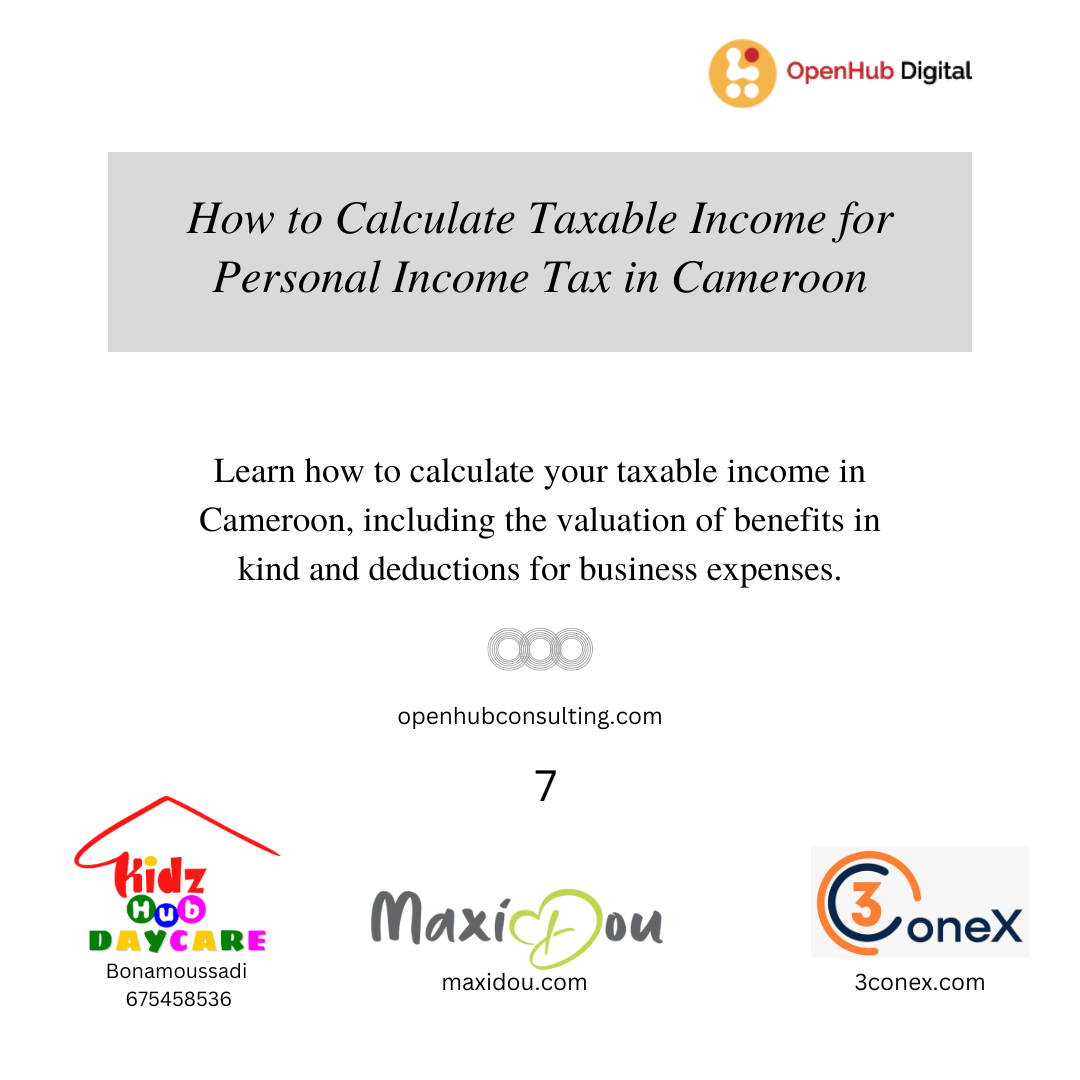In our previous post, we discussed types of income exempt from personal income tax. Now, let’s dive into how taxable income is calculated for personal income tax in Cameroon, focusing on the inclusion of salaries, benefits in kind, and allowable deductions.
Determining the Gross Income
The basis of assessment for personal income tax is the gross amount of all earnings. According to Sections 32 and 33, this includes:
- Salaries and Wages: Your total salary or wages.
- Allowances: Any additional allowances received.
- Emoluments: Payments for services rendered.
- Pensions and Life Annuities: Regular payments received as pensions or life annuities.
- Benefits in Kind: Non-cash benefits provided by the employer, valued according to specific rates.
Examples of Benefits in Kind
Here’s how to value various benefits in kind according to the tax code:
If this article helped you, you can support our work at OpenHub.
Support OpenHub Digital- Housing: 15% of the gross taxable wage.
- Electricity: 4% of the gross taxable wage.
- Water: 2% of the gross taxable wage.
- Servants: 5% for each servant.
- Vehicle: 10% for each vehicle.
- Food: 10% of the gross taxable wage.
- Telephone: 5% of the gross taxable wage.
- Fuel: 10% of the gross taxable wage.
- Security Guard: 5% of the gross taxable wage.
- Internet: 5% of the gross taxable wage.
If you receive any benefits not listed above, they are valued at their actual cost.
Calculating Net Taxable Income
To find your net taxable income, deduct certain allowable expenses from your gross income:
- Gross Amount Paid: Sum of your gross salary, allowances, and benefits in kind.
- Business Expenses Deduction: A fixed rate of 30% of your gross income, with a cap of CFAF 4,800,000 per year.
- Compulsory Contributions: Any contributions paid to the State or the National Social Insurance Fund (NSIF) for compulsory retirement.
Example Calculation
Let’s say you earn CFAF 10,000,000 annually with additional benefits in kind such as housing and a vehicle.
- Gross Salary: CFAF 10,000,000
- Housing Benefit (15%): CFAF 1,500,000
- Vehicle Benefit (10%): CFAF 1,000,000
Total Gross Income: CFAF 12,500,000
Next, apply the deductions:
- Business Expenses (30%): CFAF 3,750,000 (capped at CFAF 4,800,000, so use CFAF 3,750,000)
- Compulsory Contributions: Let’s assume CFAF 500,000
Total Deductions: CFAF 4,250,000
Net Taxable Income: CFAF 12,500,000 – CFAF 4,250,000 = CFAF 8,250,000
This net taxable income is the amount subject to personal income tax.
Key Points
- Ensure all benefits in kind are valued correctly and included in your gross income.
- Apply the standard deductions for business expenses and compulsory contributions.
- Always keep your documentation up-to-date to substantiate these calculations.
Disclaimer
This content is for informational purposes only and should not be taken as tax advice. For personalized assistance, consult a tax professional.
Next Steps
In our next post, we’ll cover how to handle income from stocks and shares for personal income tax in Cameroon. Stay tuned!
For professional assistance in company registration, tax declaration, and more, visit OpenHub Consulting. We help start, run, and grow businesses in Cameroon with services like sales and marketing, bookkeeping, and accounting for small businesses.
Have questions? Leave a comment or revisit our previous post here.
Previous Post: Types of Income Exempt from Personal Income Tax in Cameroon
Next Post: How to Handle Income from Stocks and Shares for Personal Income Tax
If this article helped you, you can support our work at OpenHub.
Support OpenHub DigitalFrom Insight to Implementation
Going through the administrative and legal landscape in Cameroon requires more than just information—it requires a grounded local partner. At OpenHub Consulting, we specialize in helping the diaspora and international investors turn their business visions into compliant, operational realities.
If you are ready to move forward, our team is prepared to manage your registration and compliance from start to finish.
Start Your Company Incorporation →Discover more from OpenHub Digital
Subscribe to get the latest posts sent to your email.


One thought on “How to Calculate Taxable Income for Personal Income Tax in Cameroon”
Comments are closed.